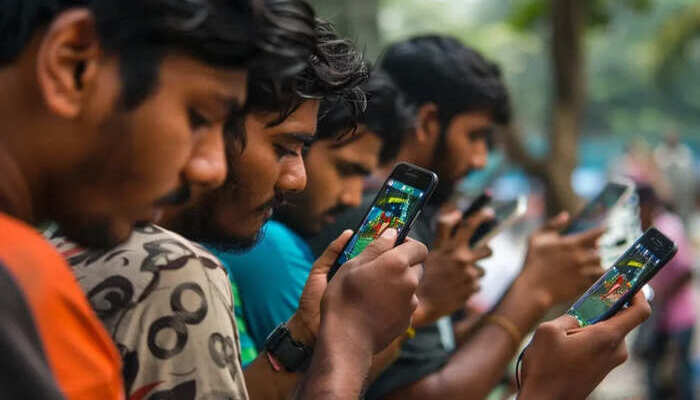
Teenage addiction to online gambling is on the rise in Korea
Online gambling is becoming an increasing source of addiction for young people in Korea.
After playing with another student last year, Kim Gi-chan, 15, began to play online casino games. He regularly engaged in baccarat.
Kim told the media, “I sometimes earn 2 million won [$1,630] in just an hour and lose 3 million won in just a half-hour.
Kim used Kakao Bank, an online institution that dispenses with the need for a face-to-face application in order to conduct financial operations.
Teenagers typically play and wager on simple games like roulette and the so-called snail race, which features wagers on racing virtual snails.
Companies can use simple games to attract young people.
According to a police officer from the Gyeonggi Bukbu Police Agency’s cyber unit, “As so many gambling sites are being created, these businesses are actively recruiting the youth, seeing them as potential customers.”
In reality, students in Korea are having a lot of trouble with online gambling. According to the Korea Problem Gambling Agency (KCGP), a total of 7,063 students received medical treatment for gambling addictions between 2017 and 2021.
In a survey of 18,444 students, around 26 percent said they have played a gambling game on the internet in the last three months, and 4.8 percent were at risk for addiction, according to Kstat Research.
Many say the Covid-19 pandemic has contributed to the rapid spread of online gambling among teenagers and children.
“Students have had greater accessibility to gambling sites since they have been highly online during the Covid-19 pandemic,” said a 37-year-old counselor at Paichai High School in Gangdong District, eastern Seoul.
“There are some stats that say the number of counseling cases for youth gambling has declined, but this is because students are not physically coming to school.”
Social media is another contributing factor.
“Students spend more time on social media since the pandemic and these illegal gambling sites are spread through social media pages,” a police officer at Gwanak Police Precinct said.
A higher-than-expected number of students are exposed.
“Around 10 out of 30 students have experienced online gambling, according to what therapists currently working at schools say,” said a spokesperson from KCGP.
Non-face-to-face transactions between people have also contributed to the spread of online gambling.
Experts say as teenage students can easily open accounts through mobile financial services, including internet banks such as Kakao Bank and Toss, gambling online have become more tempting.
Teenagers now even display bank account numbers on their social media profiles.
“Students begin to illegally use the sports betting service Toto from the second year of middle school, as they can open Kakao Bank accounts from that age,” said a police officer from the Gyeonggi Bukbu Police Agency.
Students often learn about illegal gambling sites through other illegal sites such as Newtoki, an illegal webtoon site popular with students, which has banners advertising gambling sites.
“These gambling sites often use Illegal webtoons and illegal porn websites as means to advertise,” said a spokesperson from the police agency.
“It is a win-win strategy for these illegal businesses as they advertised each other’s businesses.”
The websites use a virtual private network (VPN) to evade the authorities. Operators keep the websites going by slightly changing the address number when authorities block the pre-existing websites.
The illegal webtoon website Newtoki was on its 183rd website as of December last year.
The Korea Communications Standards Commission has shut down or blocked over 40,000 websites over the past five years.
Experts raise concern that some students are not even aware that such games are gambling.
“Students who come for counseling are mostly at risk of having major financial issues or are about to be criminally punished,” said a spokesperson from the KCGP.
Some say parents need to acknowledge reality and be cautious.
“There are quite a few parents who learn of their children’s online gambling only after the authorities launch investigations into their children and are shocked,” said a school police officer from the Gwanak Police Precinct.
“Parents should suspect their children if they possess expensive fashion items such as shoes or bags that were not purchased by them.”
Adolescents that Gamble Online Rank Higher on Severity Scale
After analyzing the survey, the researchers found the online group’s average severity score was three times higher than the offline group.
In addition to being more severe, the online gambling group displayed certain unique characteristics.
A core symptom specific to online gamblers was that gambling made them feel bad. They also had a habit of returning to recoup their losses. Online players were also characterized by a tendency to avoid non-gambling peers and, consequently, experience social withdrawal.
Stealing was a common problem among both groups of youth gamblers, as was skipping or quitting activities.
These symptoms, researchers explained, can lead to leaving school early.
Adolescent gambling is gradually emerging as a serious health problem that requires more rigorous research attention.
The researchers expect these early findings to help improve adolescent gambling treatment in the shorter term.
The finding indicates that stealing behavior in online and offline gambling is the most closely and strongly related factor with other gambling-related symptoms in adolescents, and this result suggests the clinical importance of examining gambling-related stealing behavior when screening and evaluating pathological gambling.
Other Interesting Articles
 Broader national security law takes effect in Macau
Broader national security law takes effect in MacauMay 31, 2023











